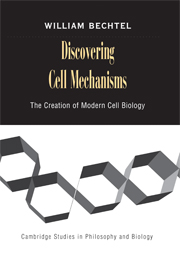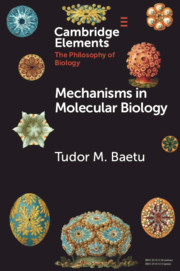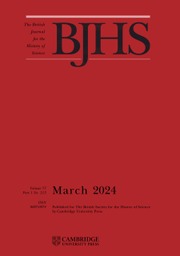Discovering Cell Mechanisms
The Creation of Modern Cell Biology
$95.00 (C)
Part of Cambridge Studies in Philosophy and Biology
- Author: William Bechtel, University of California, San Diego
- Date Published: October 2005
- availability: Available
- format: Hardback
- isbn: 9780521812474
$
95.00
(C)
Hardback
Other available formats:
Paperback
Looking for an examination copy?
If you are interested in the title for your course we can consider offering an examination copy. To register your interest please contact [email protected] providing details of the course you are teaching.
-
Between 1940 and 1970, pioneers in the new field of cell biology discovered the operative parts of cells and their contributions to cell life. Cell biology was a revolutionary science in its own right, but in this book, it also provides fuel for yet another revolution, one that focuses on the very conception of science itself. Laws have traditionally been regarded as the primary vehicle of explanation, but in the emerging philosophy of science it is mechanisms that do the explanatory work. William Bechtel emphasizes how mechanisms were discovered by cell biologists.
Read more- Develops an account of mechanistic explanation as it figures in the biological sciences
- Advances a revolutionary approach to philosophy of science in which mechanistic explanation is emphasised rather than laws
- Analyses the history of discovery of cell mechanisms and of the research techniques and instruments involved
Reviews & endorsements
This volume…will be useful not only to cell biologists interested in the embryology of their field, but also to theorists and historians of science concerned with the boundaries of fields of intellectual inquiry.
-ChoiceSee more reviews"For decades historians have been preoccupied with genetics and molecular biology. However, mitochondria, ribosomes, Golgi bodies, and lysosomes explain the life processes of the cell; DNA does so only peripherally. This is their much needed story."
-Douglas Allchin, Isis"Historians will appreciate Bechtel's thorough research in the archives of the Rochefeller Foundation and the American Society for Cell Biology, as well as his use of oral history interviews with some of the principal scientists...Cell biologists especially welcome this new history of their field."
-Lindley Darden, University of Maryland, Journal of the History of BiologyCustomer reviews
Not yet reviewed
Be the first to review
Review was not posted due to profanity
×Product details
- Date Published: October 2005
- format: Hardback
- isbn: 9780521812474
- length: 334 pages
- dimensions: 235 x 163 x 27 mm
- weight: 0.575kg
- availability: Available
Table of Contents
Part I. Introduction: Cell Mechanisms and Cell Biology:
1. A different kind of science
2. The organization of science into disciplines
3. The new discipline of cell biology
Part II. Explaining Cellular Phenomena through Mechanisms:
4. Historical conceptions of mechanism
5. Twentieth century conceptions of mechanism
6. Current conceptions of mechanisms
7. Representing and reasoning about mechanisms
8. Levels of organization and reduction
9. Organization: from Cartesian to biological mechanisms
10. Discovering and testing models of mechanisms
11. Conclusions
Part III. The Locus of Cell Mechanisms: Terra Incognita Between Cytology and Biochemistry:
12. Cytological contributions to discovering cell mechanisms up to 1940
13. Biochemical contributions to discovering cell mechanisms up to 1940
14. The need to enter the Terra Incognita between cytology and biochemistry
Part IV. Creating New Instruments and Research Techniques to Study Cell Mechanisms:
15. The epistemology of evidence: judging artifacts
16. The ultracentrifuge and cell fractionation
17. The electron microscope and electron microscopy
18. A case study of an artifact charge
19. Equipped with new instruments and techniques to enter Terra Incognita
Part V. Entering the Terra Incognita Between Biochemistry and Cytology:
20. First steps towards cell biology at the Rockefeller Institute: Claude's introduction of cell fractionation
21. Robert Bensley: an alternative approach to fractionalism
22. Competing interpretations of fractions from normal cells
23. Linking Claude's microsomes to protein synthesis
24. Adding a biochemical perspective to the Rockefeller Laboratory
25. Adding electron microscopy as a tool
26. The state of cell studies at the end of the 1940's
Part VI. New Knowledge: the Mechanisms of the Cytoplasm:
27. The mitochondrion
28. Microsomes, the endoplasmic reticulum, and ribosomes
29. Two additional organelles
30. Giving cell biology an institutional identity.
Sorry, this resource is locked
Please register or sign in to request access. If you are having problems accessing these resources please email [email protected]
Register Sign in» Proceed
You are now leaving the Cambridge University Press website. Your eBook purchase and download will be completed by our partner www.ebooks.com. Please see the permission section of the www.ebooks.com catalogue page for details of the print & copy limits on our eBooks.
Continue ×Are you sure you want to delete your account?
This cannot be undone.
Thank you for your feedback which will help us improve our service.
If you requested a response, we will make sure to get back to you shortly.
×






